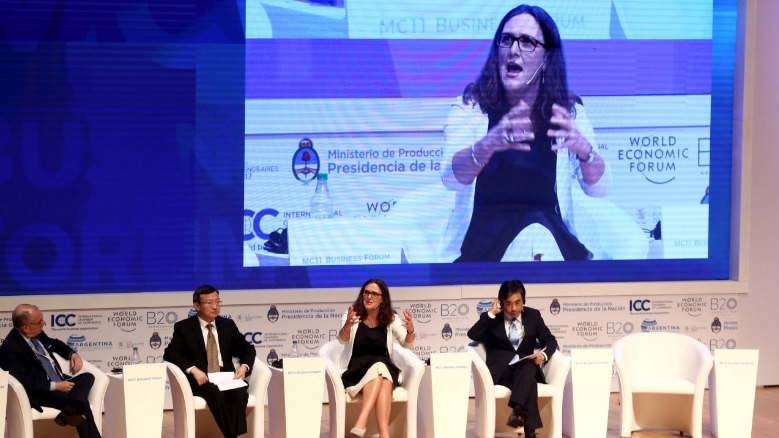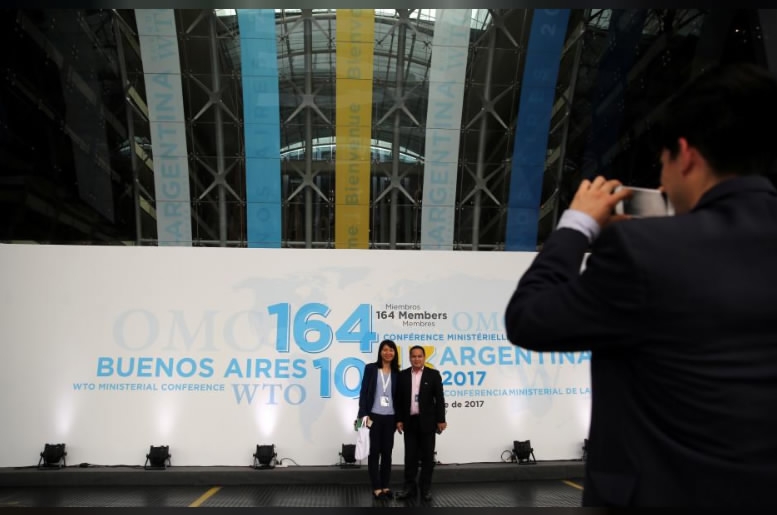
Business
15:38, 14-Dec-2017
US criticism dampens WTO conference, ends in a stalemate
Alok Gupta

The World Trade Organization’s (WTO) conference in Buenos Aires ended in a stalemate on key issues amid severe criticism from the US.
WTO’s Director-General Roberto Azevedo on the concluding day of the 11th Ministerial Conference (MC 11) said, “Outcome of the conference is disappointing.”
“In the last two Ministerials, we saw good outcomes. We need to do real soul searching to resolve the issues,” he added.
Ministers and delegates from around 70 countries had gathered in Buenos Aires from Dec. 10-13 to resolve critical issues related to the subsidy for fisheries, agriculture and a consensus on medium and small-sized enterprises, and e-commerce.
The MC 11 had started on a sour note with the US doubting the WTO's role in resolving the trade disputes, and accused the organization of preferential treatment to ‘a group of countries’ because of their allegedly dubious development status.
The US trade representative Robert Lighthizer, on the first day of the conference, said, "There is something wrong, in our view, when five of the six richest countries in the world presently claim developing country status," he said.
India and China stand against ending agriculture and fisheries subsidy unresolved
While India along with other developing countries has been opposing any attempt to phase-out fuel subsidies for fisheries by 2020, China is advocating selective phasing out of the subsidies.
The WTO had been pushing for a binding agreement to eliminate fisheries subsidies as a part of sustainable fishing under UN's sustainable development goal (SDG).
Developing nations argue that subsidy is a backbone for pulling out fishermen from poverty. China alone doles out 6 billion US dollars as part of fuel subsidy to the shipping sector involved in fishing.
India vehemently opposed any move against an interim decision on fisheries subsidy; Indian delegation argued that fisheries subsidies can be discussed at the 12th ministerial.
There is also pressure on developing nations to eliminate overfishing to control illegal, unreported and unregulated (IUU) fishing, by 2020.

Two people pose for a photo outside the headquarters of the 11th World Trade Organization's ministerial conference in Buenos Aires, Argentina December 13, 2017. /Reuters Photo
Two people pose for a photo outside the headquarters of the 11th World Trade Organization's ministerial conference in Buenos Aires, Argentina December 13, 2017. /Reuters Photo
Conference chair Susana Malcorra said, on the issue of fisheries an agreement has been made on moving forward with the negotiations.
“There was a deadlock on the issue for the last 15 years, and we have overcome that deadlock by agreeing to discuss it in next negotiations. Buenos Aires will be known for fisheries conference,” she said.
India, China, and Indonesia, as a part of the G33 coalition, were also seeking a complete exemption to curtail agricultural stockholding, including subsidies, minimum support prices, and poverty alleviation initiatives.
The policy of public stockholding of agricultural produce is an effort to promote food security by purchasing and distributing food grains at a fixed minimum-support price decided by the government in developing and least developing nations.
Replying to a question on the current stalemate on the issue of agriculture and fisheries, Roberto Azevedo said, “Clearly, there was no outcome on both the issues, and it’s unfortunate. But the negotiations will continue.”
On the concluding day of the conference, the US, EU, and Japan pledged to abide negotiating rules on e-commerce after a consensus on the issue failed. China, India, Vietnam, and Indonesia did not attend the negotiation.
WTO had roped in Alibaba’s Jack Ma to boost the talks on e-commerce.
Amid the stalemate and prevailing gloom, on the concluding day of the conference, Susana Malcorra pointed out that efforts were made to include issues of 21st centuries into the WTO fold.
“We discussed to include issues like gender, small and medium enterprise and women in trade,” she said. She further added, “We may have fallen short on many issues, but there is life after Buenos Aires.”

SITEMAP
Copyright © 2018 CGTN. Beijing ICP prepared NO.16065310-3
Copyright © 2018 CGTN. Beijing ICP prepared NO.16065310-3